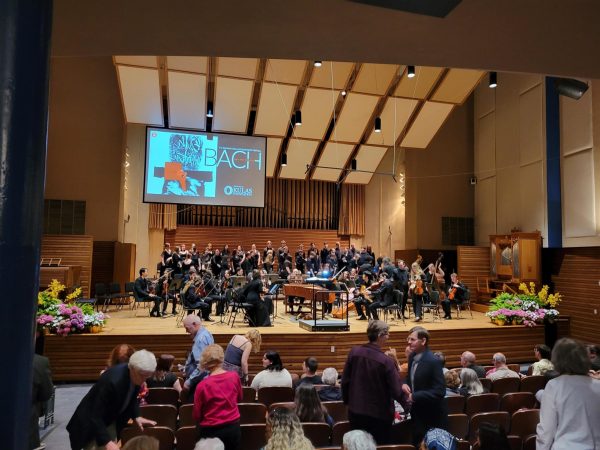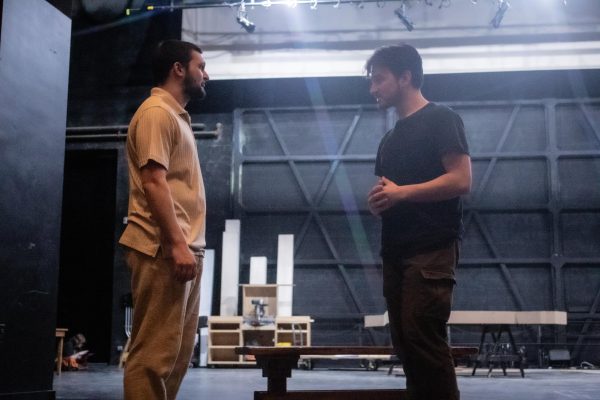BW graduate students win second place in Cleveland business administration competition
On Friday, Jan. 19, Baldwin Wallace University’s team of five Master of Business Administration (MBA) students won second place among seven other university teams at the Association of Corporate Growth (ACG) Cup in Downtown Cleveland.
The team consisted of one-year MBA students Alexis Becker and Matt Baldwin, Healthcare MBA student Katelyn LeGros, hybrid MBA student Collin Mottice, and 3/2 Accounting MBA student Pedro Manolo Sandoval. Its faculty mentors were Dale Kramer, Director of MBA and Executive MBA Programs, and Kevin Flynn, adjunct faculty member of the BW School of Business.
“The ACG, Association of Corporate Growth, is essentially a worldwide network, if you will,” said Kramer. “What ACG does is provide the support to mid-capitalization business and consult to them on issues regarding decisions to acquire, merge, or divest their organizations or parts of their organizations.”
The annual ACG Cup competition in Cleveland is hosted by the ACG’s Cleveland chapter and is held to coincide with ACG Cleveland’s annual Deal Makers Week—an annual meeting of ACG members from a variety of companies, and from throughout the Midwest, said Kramer.
“The students actually received a case on Jan. 12, the week prior, so they had one week to prepare what they would do as an advising team to a business who was considering merging, acquiring, or divesting,” said Kramer. “They had to do a complete financial and strategic analysis based upon the case that they received. And then they had 20 minutes to present in a very formal boardroom environment to the ACG board. Then the ACG board would evaluate, judge, and determine results based upon the multiple teams from various universities that presented.”
When assembling the BW team for the ACG Cup, Kramer says he focused on assembling a well-rounded team with various strengths and experiences they could bring to the case they would be assigned.
“When you form a team, for example this ACG-type team,” he said, “we need individuals who are strong in their financial analysis skills. We need individuals who have strong accounting skills. But we also need students who are strong in marketing and presentation. I’m looking to blend business capabilities across the financial, marketing, business knowledge, and strategy perspectives to be on this team.”
After the team was assembled, there were still preparations to be done before they received their case.
“We get the team together and we review the presentations of past teams,” said Kramer. “We’ll even arrange some meetings with members from past teams before they get the case just to get them in the mode. And then we also try to set up what are the key roles each individual will play.”
After the team received its case for the competition, they were on their own to pull together a full analysis and presentation over the next week, Kramer said.
“Once they get the case, it’s 100% students only,” said Kramer. “Each of them probably puts in, I would say, about 30 to 40 hours. And they’re doing that in addition to going to school, and most of these students are working, also. It’s a lot of work. It’s high-pressure. But it’s very valuable for the students.”
This is BW’s 10th year entering the competition, said Kramer, and their second place win continues a long legacy of excellent performance at the competition.
BW MBA students aware of the competition and involved in the private equity industry assembled a team for BW’s first year in the ACG Cup and scored a first place victory, he said. BW has sent a team to the competition ever since, scoring multiple top four finishes over the years.
The competition ties very well into the educational philosophy of BW’s MBA program, said Kramer.
“We focus very much on combining theoretical business knowledge with application,” Kramer said. “Everything that we teach, everything that our students learn here, is not only the theory and the knowledge of business, but also how they can apply it, how they can use this, to help themselves in their career.”
“That’s why we like doing this kind of thing,” he said. “It’s an opportunity for our students to really experience, deliver, and take action on what they learned.”
The Exponent is looking for financial contributions to support our staff and our newsroom in producing high-quality, well-reported and accurate journalism. Thank you for taking the time to consider supporting our student journalists.












































